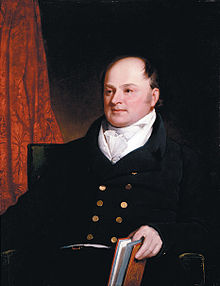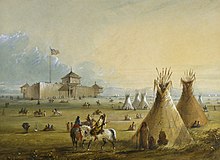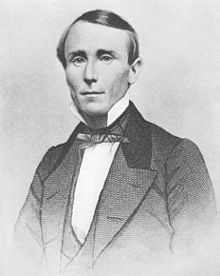Fatum Manifestum

Fatum Manifestum (Anglice Manifest Destiny) fuit fides, in Civitatibus Foederatis saeculo undevicensimo late habita, colonos Americanos se per continentem extendere destinavisse. Rerum gestarum scriptores hodierni plerumque inter se congruunt huic notioni esse tria argumenta prima:
- Praecipuae hominum Americanorum virtutes et eorum institutiones;
- Propositum Americanum ad occidentem redimendum et reficiendum ut imago Americae agrariae;
- Fatum invictum ad hoc munus necessarium faciendum.[2]
Fridericus Merk historicus dicit hanc notionem exortam esse ex "notione finis ad Mundum Veterem redimendum per exemplum altum . . . per latentem terrae novae potentiam ad caelum novum aedificandum generata."[3][4]

Historici fatum manifestum notionem certatam fuisse expresserunt, quam Democratici comprobaverunt, sed multi Americani notabiles (sicut Abrahamus Lincoln, Ulixes S. Grant, et plurimi Whigs) reiecerunt. Daniel Walker Howe historicus scribit: "Imperialismus Americanus consensum Americanum non repraesentavit; intra politiam nationalem dissensionem acrem commovit. . . . Homines Whig moralem Americae finem exemplum democraticum potius quam victoria bellica videbant."[5][6]

Ioannes L. O'Sullivan, editor diarii, locutionem fatum manifestum anno 1845 excogitavit ad essentiam huius sententiae decribendam, certum sonum rhetoricum.[7] A civibus Democraticis annis 1840 ad bellum cum Mexico excusandum, et ad dimidium terrae Oregoniae cum Britanniarum Regno dividendum adhibebatur. Sed fatum manifestum semper claudicavisse ob eius circumscriptiones internas et rem servitutis dicit Merk. Notio numquam facta est finis nationalis. Ante 1843, Ioannes Quintius Adams, olim maior fautor notionis in qua fatum manifestum conditum erat, sententiam mutaverat et expansionismum repudiaverat quia extentionem servitutis in Texia significabat.[8]
Fridericus Merk colligit:
Ab initio, Fatum Manifestum—programmate vastum, in ea notione continentalismi—solum subsidium parvum habuit. Assectatoribus nationalibus, sectionalibus, factionalibus eius magnitudini adaequatis caruit. Causa fuit id spiritum nationalem non significare. Thesis quod nationalismum informavit, in multis scripturis historicis inventis, per pauca indicia vere adiuvantia sustinetur.[9][10]
Locutio fatum manifestum saepissime cum territoriali Civitatum Foederatarum expansione ab 1812 ad 1860 consociatur. Haec aetas, a fine Bellum anni 1812 ad Bellum Civile Americanum conflatum, aetas fati manifesti appellata est.[11] Hoc tempore, Civitates Foederatae ad Oceanum Pacificum expandebantur—"a mari ad mare nitens"—fines Civitatum Foederatarum contiguarum plerumque definientes ut hodie videntur.[12]
Nexus interni






- Auctores et litterae
- Thomas Hart Benton—senator Missuriensis, expansionis occidentalis suasor
- Stephanus A. Douglas—prominens "Americae Iuvenis" suasor
- Horatius Greeley—fecit ut gratiosa apud populum esset locutio "I ad occidentem, iuvenis."
- Duff Green—scriptor, politicus, et prominens fati manifesti sausor
- Franciscus Fuller Victor—prominens historicus et fictionis scriptor qui spiritum expansionis occidentalis cepit
- "The White Man's Burden"—poema Rudyard Kipling magni momenti, quod colonizatio a Civitatibus Foederatis suasit
- Res
Notae
[recensere | fontem recensere]- ↑ "John Gast, American Progress, 1872". Picturing U.S. History. City University of New York.
- ↑ Robert J. Miller (2006). Native America, Discovered And Conquered: Thomas Jefferson, Lewis & Clark, And Manifest Destiny. Greenwood. p. 120.
- ↑ Anglice: "a sense of mission to redeem the Old World by high example . . . generated by the potentialities of a new earth for building a new heaven."
- ↑ Merk 1963.
- ↑ Anglice:"American imperialism did not represent an American consensus; it provoked bitter dissent within the national polity. . . . Whigs saw America's moral mission as one of democratic example rather than one of conquest."
- ↑ Daniel Walker Howe, What Hath God Wrought: The Transformation of America 1815–1848 (2007), 705–706.
- ↑ "29. Manifest Destiny". American History. USHistory.org
- ↑ Merk 1963, pp. 215-216.
- ↑ Anglice: "From the outset Manifest Destiny—vast in program, in its sense of continentalism—was slight in support. It lacked national, sectional, or party following commensurate with its magnitude. The reason was it did not reflect the national spirit. The thesis that it embodied nationalism, found in much historical writing, is backed by little real supporting evidence."
- ↑ Merk 1963, p. 215.
- ↑ Kurt Hanson; Robert L. Beisner. American Foreign Relations since 1600: A Guide to the Literature, Second Edition. ABC-CLIO. pp. 313. ISBN 9781576070802
- ↑ Stuart et Weeks hoc aevum tempus fati manifesti (Anglice era of manifest destiny) et aetatem fati manifesti (Anglice age of manifest destiny) proprie appellant.
Bibliographia
[recensere | fontem recensere]- Adams, Sean Patrick. 2008. The Early American Republic: A Documentary Reader. Wiley–Blackwell. ISBN 9781405160988.
- Bryan, William Jennings. 1899. Republic or Empire?
- Beveridge, Albert J. (1908). The Meaning of the Times and Other Speeches. Indianapolis: The Bobbs–Merrill Company
- Crenshaw, Ollinger (1941). "The Knights of the Golden Circle: The Career of George Bickley". The American Historical Review 1 (42): 23–50
- Crocker, H. W. (2006). Don't tread on me: a 400-year history of America at war, from Indian fighting to terrorist hunting. Crown Forum. ISBN 9781400053636
- Cheery, Conrad (1998). God's New Israel. The University of North Carolina Press. pp. 424. ISBN 9780807847541
- Greene, Laurence (2008). The Filibuster. Novi Eboraci: Kessinger Publishing, LLC. pp. 384. ISBN 978-1436695312
- Fisher, Philip (1985). Hard facts: setting and form in the American novel. Oxford University Press. ISBN 9780195035285
- Fuller, John Douglas Pitts (1936). The movement for the acquisition of all Mexico, 1846–1848. Baltimorae: Johns Hopkins Press
- Greenberg, Amy S. (2005). Manifest manhood and the antebellum American empire. Cambridge University Press. ISBN 9780521840965
- Hietala, Thomas R. (February 2003). Manifest Design: American Exceptionalism and Empire. Cornell University Press. ISBN 9780801488467 Previously published as Hietala, Thomas R. (1985). Manifest design: anxious aggrandizement in late Jacksonian America. Cornell University Press. ISBN 9780801417351
- Hudson, Linda S. (2001). Mistress of Manifest Destiny: a biography of Jane McManus Storm Cazneau, 1807–1878. Texas State Historical Association. ISBN 9780876111796
- Johannsen, Robert Walter (1997). Manifest destiny and empire: American antebellum expansionism. Texas A&M University Press. ISBN 9780890967560
- Klinghoffer, Arthur Jay (2006). The power of projections: how maps reflect global politics and history. Greenwood Publishing Group. ISBN 9780275991357
- Ford, Paul L., ed. (2010). Works of Thomas Jefferson, IX. Cosmo Press Inc.. ISBN 9781616402105
- May, Robert E. (2004). Manifest Destiny's Underworld. The University of North Carolina Press. pp. 448. ISBN 978-0807855812
- Mattelart, Armand (1996). The Invention of Communication. U of Minnesota Press. ISBN 9780816626977
- McDougall, Walter A. (1997). Promised land, crusader state: the American encounter with the world since 1776. Houghton Mifflin. ISBN 9780395830857
- Merk, Frederick (1963). Manifest Destiny and Mission in American History. Harvard University Press. ISBN 9780674548053
- Prucha, Francis Paul (1995). The great father: the United States government and the American Indians. U of Nebraska Press. ISBN 9780803287341
- Ripley, Peter C. (1985). The Black Abolitionist Papers. Chapel Hill, NC: University of North Carolina Press. pp. 646
- Rossiter, Clinton (1950). "The American Mission". The American Scholar (The American Scholar) (20): 19–20
- Sampson, Robert (2003). John L. O'Sullivan and his times. Kent State University Press. ISBN 9780873387453
- Stephanson, Anders (1996). Manifest destiny: American expansionism and the empire of right. Hill and Wang. ISBN 9780809015849
- Stuart, Reginald C. (1988). United States expansionism and British North America, 1775–1871. University of North Carolina Press. ISBN 9780807817674
- Somkin, Fred (1967). Unquiet Eagle: Memory and Desire in the Idea of American Freedom, 1815–1860. Ithaca, N.Y.
- Strong, Josiah (1885). Our Country. Baker and Taylor Company
- Tuveson, Ernest Lee (1980). Redeemer nation: the idea of America's millennial role. University of Chicago Press. ISBN 9780226819211
- Weeks, William Earl (1996). Building the continental empire: American expansion from the Revolution to the Civil War. Ivan R. Dee. ISBN 9781566631358
- Ward, John William (1962). Andrew Jackson : Symbol for an Age: Symbol for an Age. Oxford University Press. ISBN 9780199923205
- Weinberg, Albert Katz; Walter Hines Page School of International Relations (1935). Manifest destiny: a study of nationalist expansionism in American history. The Johns Hopkins Press. ISBN 0404147062
- Wanklyn, Harriet (1961). Friedrich Ratzel: A Biographical Memoir and Bibliography
Bibliographia addita
[recensere | fontem recensere]Commentarii in periodicis editi
[recensere | fontem recensere]- Dunning, Mike (2001). "Manifest Destiny and the Trans-Mississippi South: Natural Laws and the Extension of Slavery into Mexico.". Journal of Popular Culture 35 (2): 111–127
- Pinheiro, John C (2003). "'Religion Without Restriction': Anti-catholicism, All Mexico, and the Treaty of Guadalupe Hidalgo". Journal of the Early Republic 23 (1): 69–96
- Sampson, Robert D (2002). "The Pacifist-reform Roots of John L. O'Sullivan's Manifest Destiny". Mid-America 84 (1–3): 129–144
Libri
[recensere | fontem recensere]- Brown, Charles Henry (Ianuario 1980). Agents of manifest destiny: the lives and times of the filibusters. University of North Carolina Press. ISBN 9780807813614
- Burns, Edward McNall (1957). The American idea of mission: concepts of national purpose and destiny. Rutgers University Press
- Fresonke, Kris (2003). West of Emerson: the design of manifest destiny. University of California Press. ISBN 9780520231856
- Gould, Lewis L. (1980). The Presidency of William McKinley. Regents Press of Kansas. ISBN 9780700602063
- Graebner, Norman A. (1968). Manifest destiny. Bobbs–Merrill. ISBN 0672509865
- Heidler, David Stephen; Heidler, Jeanne T. (2003). Manifest destiny. Greenwood Press. ISBN 9780313323089
- Hofstadter, Richard (1965). "Cuba, the Philippines, and Manifest Destiny". The paranoid style in American politics: and other essays. Knopf
- Horsman, Reginald (1981). Race and manifest destiny: The origins of American racial Anglo-Saxonism. Harvard University Press. ISBN 9780674948051
- McDonough, Matthew Davitian. 2011. Manifestly Uncertain Destiny: The Debate over American Expansionism, 1803–1848. Dissertatio PhD, Kansas State University.
- Merk, Frederick, et Lois Bannister Merk. 1963. Manifest Destiny and Mission in American History: A Reinterpretation. Novi Eboraci: Knopf.
- May, Robert E. (2002). Manifest destiny's underworld: filibustering in antebellum America. University of North Carolina Press. ISBN 9780807827031
- Morrison, Michael A. (18 Augusti 1999). Slavery and the American West: The Eclipse of Manifest Destiny and the Coming of the Civil War. UNC Press Books. ISBN 9780807847961
- Sampson, Robert (2003). John L. O'Sullivan and his times. Kent State University Press. ISBN 9780873387453
- Smith, Gene A. (2000). Thomas Ap Catesby Jones: commodore of Manifest Destiny. Naval Institute Press. ISBN 9781557508485
Nexus externi
[recensere | fontem recensere]- "Manifest Destiny and the U.S.–Mexican War: Then and Now," PBS
- Oratio aditialis Praesidis Polk, apud universitatem Yalensem
- Gayle Olson-Raymer, "The Expansion of Empire," apud Zinned Project

